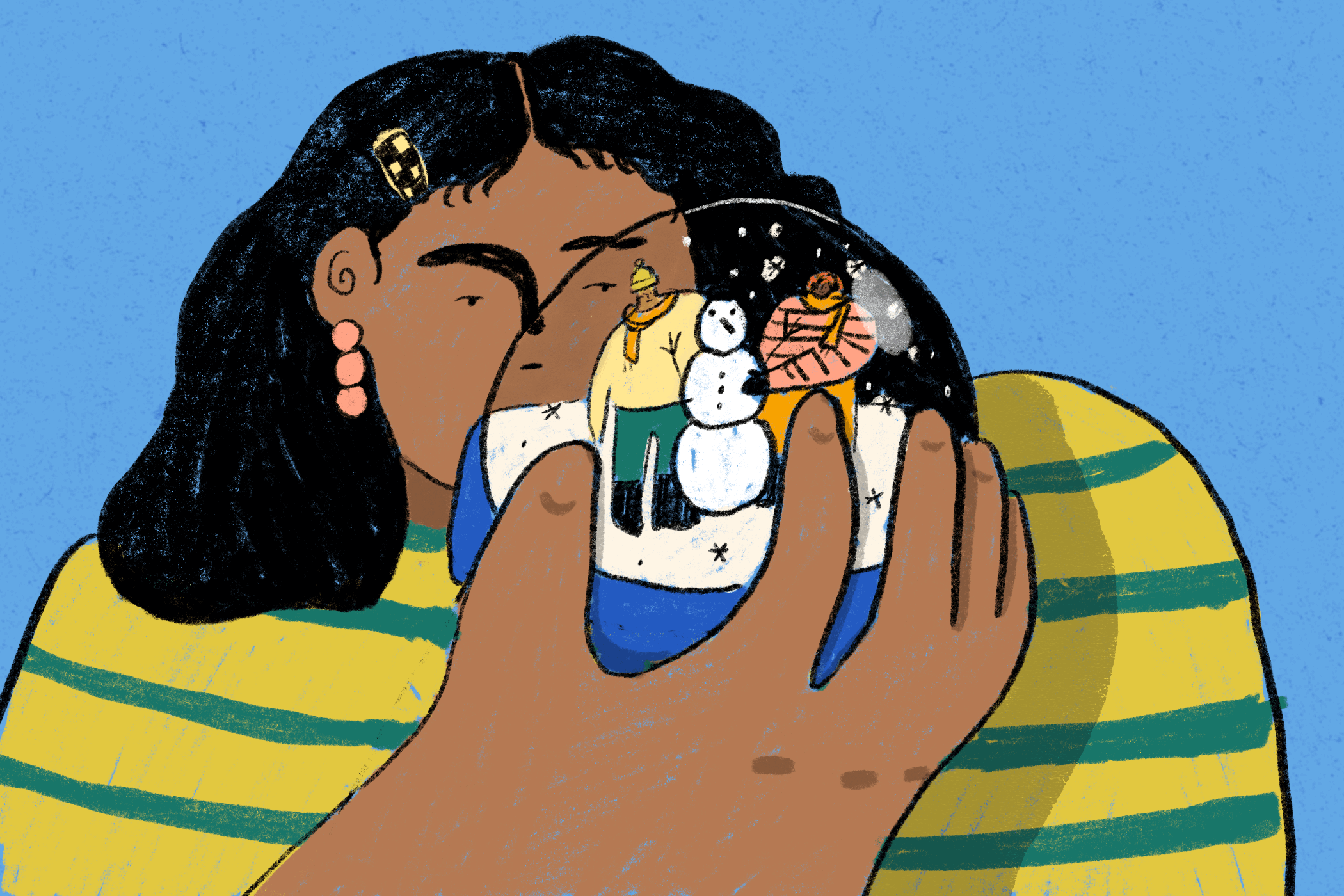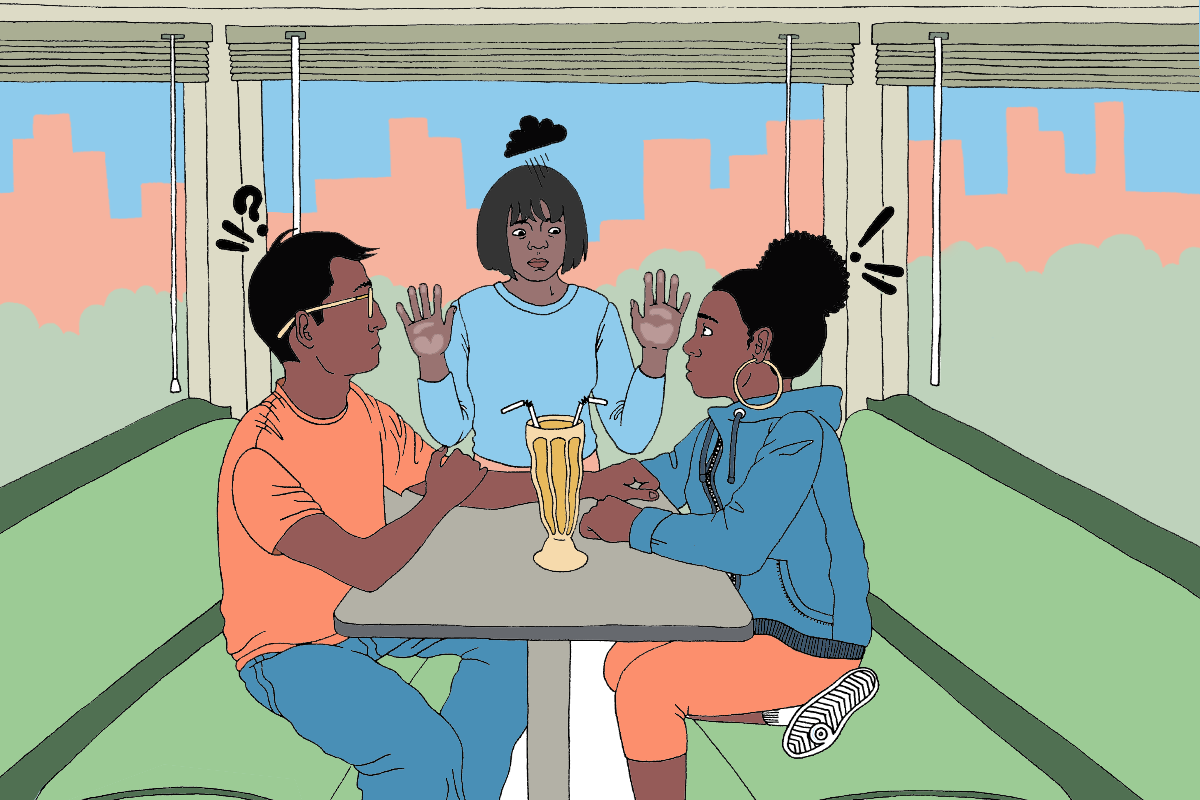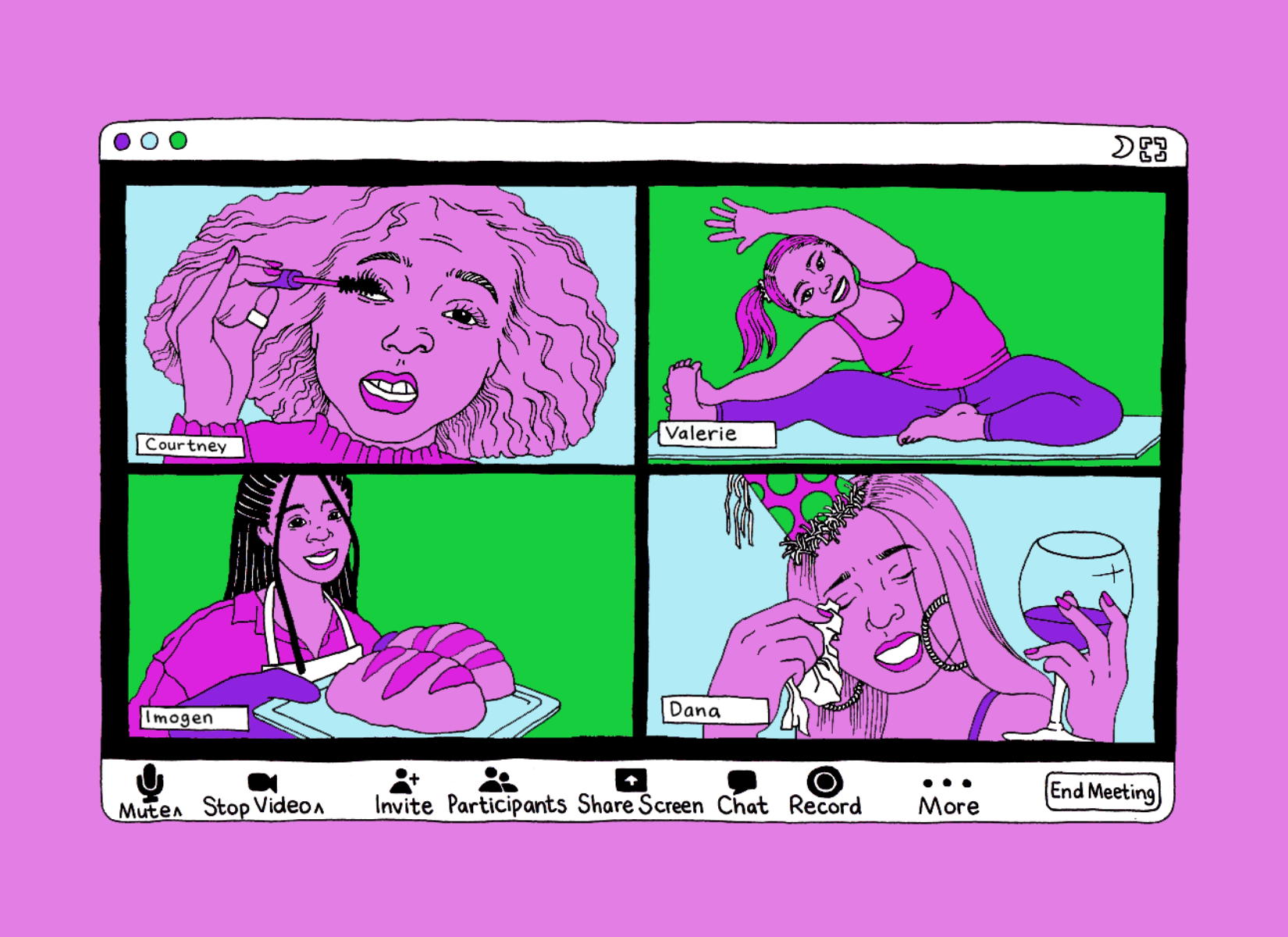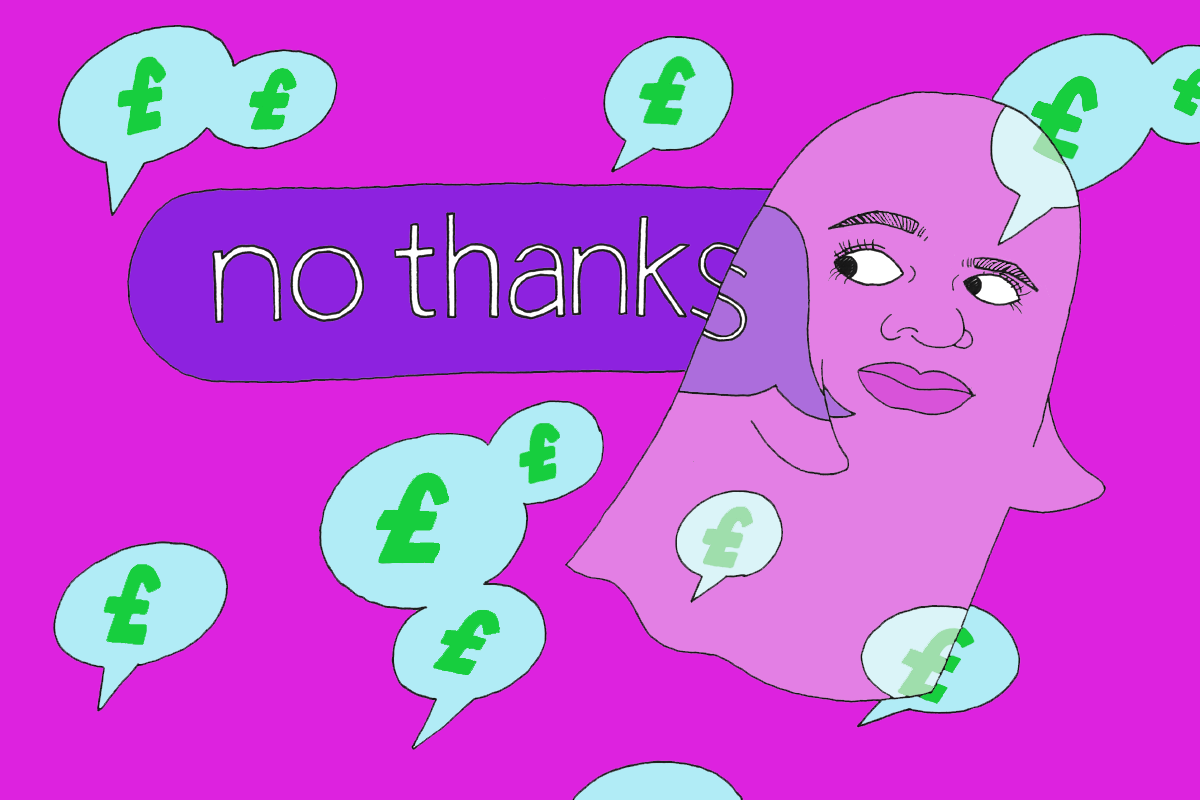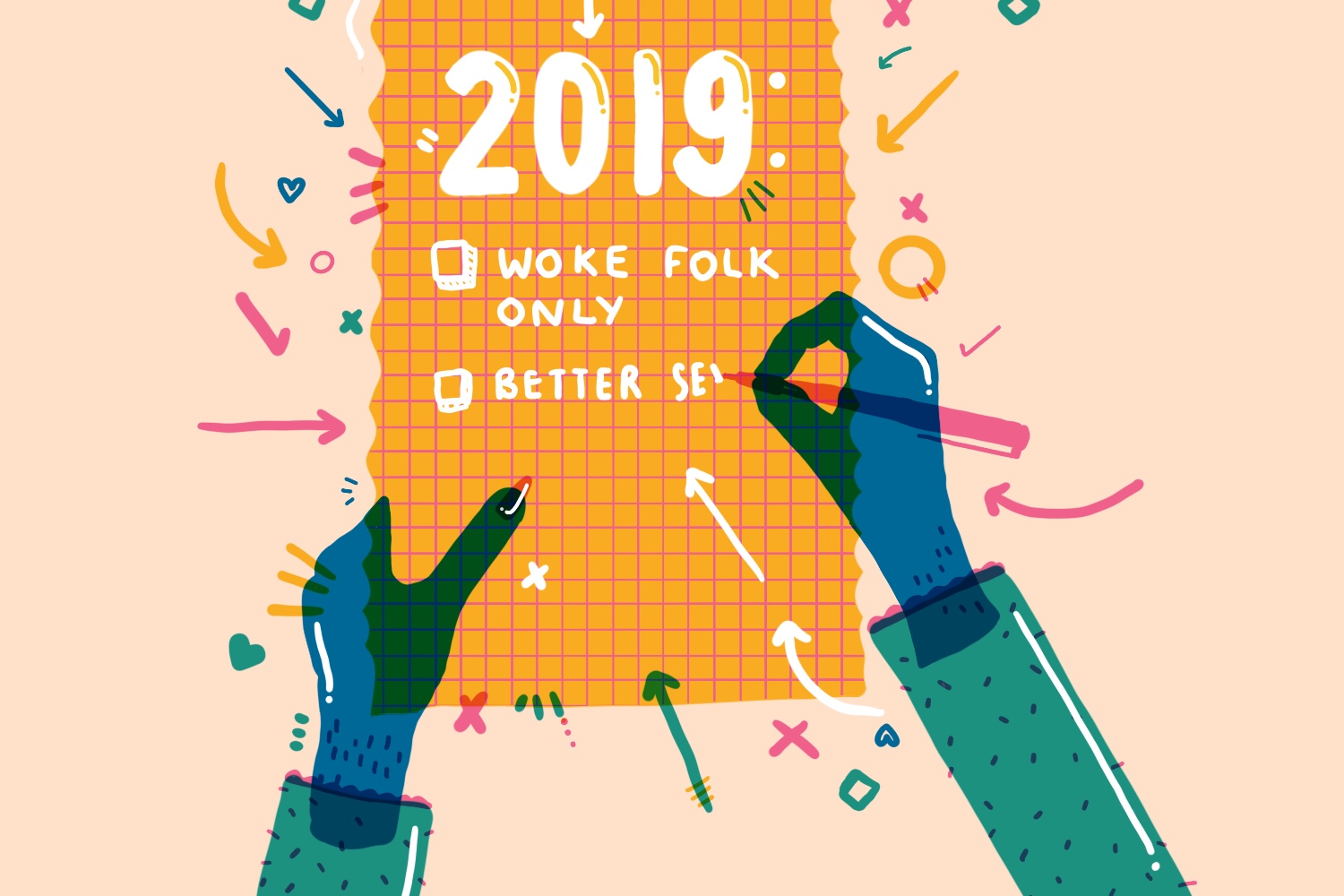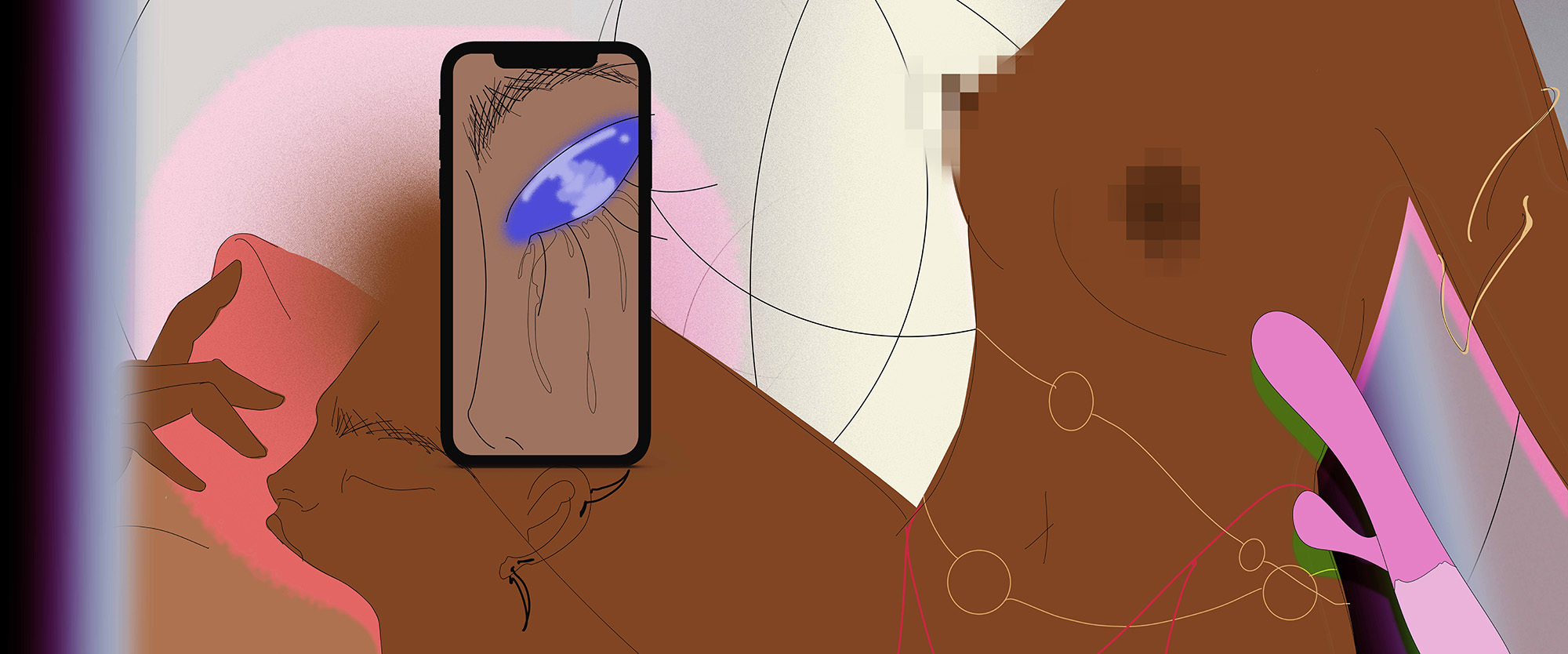
Illustration Maite Marque
Kinky zoom orgies, lingering exes and wank addictions: inside Britain’s sexual recession
What happens to single people's lives when sex, touch and intimacy basically become illegal? We investigate.
Chanté Joseph
09 Feb 2021
Most of us are gagging for intimacy right now. In the words of Pooja, we’re asking for it; we’re dying for it. I miss the sharp heat that catapulted through my body when a man pressed his hand against the small of my back before he was surely going to ruin my life. I miss the pointless tension-filled chatter before succumbing to natural urges. I miss men laughing at my random musings during pillow talk as I question things like: “isn’t it strange that to fall asleep we have to pretend to sleep?” Yet here we are, living through a double-dip sexual recession.
Sex toy company Mystery Vibe recently surveyed 2,000 people in England and found that a quarter of respondents could not remember the last time they had sex. Over a third of those surveyed felt like their sex drive decreased. Meanwhile, Elle published a list of 10 Soft Blankets That Adequately Replace Human Contact.
This lockdown has been hard for everyone but there seems to be a lack of acknowledgement for how difficult it is to be single during a pandemic. Our needs and wants as single people are trivialised as if we should simply be grateful to be alive as if anything else is a bonus. Needing affection is more than just satisfying fleeting sexual urges, it makes you feel alive and does wonders for your mental health. While the Dutch government issued guidance telling single people to find a “sex buddy” acknowledging that single people and sex should be considered in pandemic response, the UK government’s disjointed and awkward advice essentially banned sex but then made it seem like sex outside was possibly OK?
If you are longing for affection what lengths are you willing to go to just to feel something? How do we survive without intimacy? The answer lies within the stories of Britain’s single and single-adjacent people.
Sexual recession, sex toy boom
Some, like Ann-Marie, developed other vices. The 22-year-old student from Queen Mary who escaped to Ghana a few months ago, describes herself as the “Queen of grey areas” as she’s never technically been in a relationship before. When lockdown first eased last summer she hooked up with a promising guy she met on Hinge after one day of being on the app (surely a record). They spoke for a week before hooking up and it went downhill from there. “We finally did the deed but then he ghosted and gave the weirdest excuse [as the reason]” Ann-Marie explains. His eventual reappearance brought unwelcome news. “A couple of weeks later he popped up and gave me a chlamydia scare”.
The experience put Ann-Marie off pursuing other potentially risky trysts but, like most of us, needed to get her hit somewhere. Lockdown left a gaping, dildo-shaped hole where intimacy and connection used to be. “I spent about £180 of my furlough money on sex toys,” she tells me. She’s not alone. In April 2020, BuzzFeed reported that sex toy sales were up nearly 600% from the previous year. “I became a chronic masturbator doing it at least twice a day.”
“Before the pandemic, [masturbation] was more of a garnish”
Ann-Marie’s relationship to masturbation changed because of the amount she was doing it. “Before the pandemic, [masturbation] was more of a garnish, something to compliment the sex I was having with other people,” she muses. “But now I’m starting to find that when I don’t do it for a couple of days the frustration builds up.”
Trying to satisfy yourself during the lockdown can start to become a chore or a pastime, especially if you’re not being innovative. She’d already begun taking antidepressants when the lockdown hit which made her feel dead inside. To counter that she spent “a lot more money on edibles and alcohol to fill the numbness of [her] involuntary celibacy”.
Confronting existing issues
Sexless days give way to sexless nights but the abundance of time has forced people to acknowledge pre-lockdown dysfunction. Alex*, a 23-year-old writer from London tells me over a Zoom that they have never experienced romantic intimacy, only sexual trysts. They’re using this period to engage in healthier practices.
“My experience before lockdown with intimacy was flawed because I’ve never been in a relationship,” they say. “I’ve never really been romantically intimate with people. I’ve only ever been sexually intimate with people.”
This feeling was exacerbated by their gender nonconformity. “I’ve always felt as a trans person that my accessibility to dating was never like everyone else’s,” Alex tells me. “For me, when it comes to guys, it falls into fetishisation or violence. There’s no in-between. It’s either ‘I love you purely for sexual motivations’ or ‘you’re fucking disgusting’.”
“What I’m doing now is completely tearing down the relationship that I had with sex and rebuilding it”
Their difficult relationship with sex became a shield for deeper issues and led to unhealthy behaviours and attitudes. “I was essentially sexualising stress, sexualising fear, sexualising all of the bad things that were happening,” they explain.
“My way of getting out of that was to just sleep around, which in my circumstance was not healthy. Acting out through casual sex is fine for some, but for me, it wasn’t. I’m not like victim-blaming but a situation led me to my sexual assault. So after that, I went to a therapist.”
After exploring these attitudes with a therapist, Alex was told that they were a sex and love addict which lead them to join a programme to confront their issues head on. “In my first meeting I was like ‘this is a fucking cult’ but now I’m completely on board,” they tell me, sounding hopeful. The programme means no sex – obviously – no dating apps, porn or masturbation. “What I’m doing now is completely tearing down the relationship that I had with sex and rebuilding it with the knowledge that I’m an addict. [I now have a] sponsor and a community of people. It’s not easy, but I do sit with that label and accept it now.”
Rethinking sexuality
Lockdown has all forced us to face ourselves. In Alex’s case confronting and dealing with the bad and in Jessica’s case, like Kylie Jenner in 2016, she’s “realising stuff”. Mostly that she’s not actually heterosexual. The 22-year-old teaching assistant came out last year as bisexual. However, lockdown stopped her from exploring her bisexuality with the same freedom that she had previously enjoyed in her heterosexual pursuits.
“I did go on one date with a woman and it was incredible,” Jessica recalls. “There were sparks and everything but we immediately went back into another lockdown and it just fizzled out completely. Now I’m just here simping and have no way to act on it because when will we ever be free again?” Currently, Jessica says, she’s at a stage where she “only wants to centre women in [her] sex life” but without the chance to explore this side of her identity she feels “broken”.
To combat her “queer angst” she’s finding spaces online to spend time in. “I have found a few bi and lesbian couples on OnlyFans that have really shaken my table and made me realise that I’m actually more open to and into BDSM than I thought,” she tells me.
“Same-gender BDSM [erotica] seems more lustful and genuine. There is a desire for both partners to be pleased”
It took Jessica a while to work up to consuming BDSM content because her experience of sexual assault made her perceive images of men dominating women look violent, despite knowing they both consented. So she switched to same-gender BDSM partnerships. “Same-gender BDSM [erotica] seems more lustful and genuine,” Jessica says. “There is a desire for both partners to be pleased. It just feels safer.”
Technology has certainly opened up options for the sex-starved during the pandemic. Emma Sayle runs IRL sex party Killing Kittens, which bills itself as the world’s “most exclusive“, women-first sex party. During lockdown, the services has transformed itself into a quasi digital sex shaman, running workshops and advice sessions on topics like squirting and writing erotica.
While restrictions meant that they could not operate as usual, their 180,000 strong membership also eagerly signed in for online house parties, re-named as “Zorgies” by attendees. “We knew that isolation was not good for your mental health and we needed to keep that sense of belonging and support system in place, that’s really why we launched the parties, just to keep that spirit,” Emma tells me. For Killing Kittens, the move to digital was three years in the making but they have been able to successfully capitalise off the physical sexual recession.
“We’ve seen a huge increase in new members joining up and all workshops and all our workshops and parties are full,” Emma says. “Over half the people that come to our events are new people and a lot of them are saying they would have never come or looked at it before Covid-19.” She’s also launched an “advanced WhatsApp” platform for Killing Kittens members to chat on which has been majorly successful, with 90,000 downloads and 650,000 messages sent within the first three weeks of launching.
Imperfect arrangements
While a lot of us experiencing a sex drought, others have managed to lock down (sorry) a regular bed to spend their nights in. But for those who are absolutely getting theirs, are there hidden costs? Of course. Hooking up with the most convenient option can have very inconvenient results. Colin Hagan, a 40-year-old business consultant from the north of England, is spending lockdown with his ex-partner of five years. “I spent 17 years married to someone, followed by another five years with someone else, and then found myself alone at the start of a major year of isolation felt by us all,” he tells me. To avoid being alone Colin shackled up in a bubble with his ex.
Before you say it – Colin doesn’t need to be told that this is not an ideal arrangement. “This is a massive problem,” he admits. “I remain convinced she’s the most beautiful woman ever but having sex without the original intimacy is hollow. I’m happy to scratch her itch obviously but I’m beginning to feel this is more of a disservice than benefit.” Yet Colin doesn’t want to leave this situation of “faux intimacy” because intimacy elsewhere is not a given due to the current restrictions.
“This is a massive problem, sex without the original intimacy is hollow”
Ultimately Colin is looking forward to having the space to grieve the relationship and move on. “I’m resenting the ability to compartmentalise the relationship with some actual closure after over a year of limbo sex,” he tells me. He acknowledges that the longer this goes on, the more damage it might do to the potential for a long-term platonic relationship with his ex. But he excuses this because of the alternative – “two lonely people.”
The sexual recession is painful but it’s the lack of emotional intimacy that is proving the real kicker for singles. While sexual urges can be satisfied on a physical level by toys, virtual sex parties and dirty chats, it’s the feeling of being loved, cared for, and looked at like you’re not just a snack but the whole buffet, that is so hard replicate in these strange times. While some have taken the opportunity to try and address problematic behaviours, others are left in limbo, waiting for the day when it’s no longer illegal to send a “u up?” text. Wake us up when this sexual drought ends.
*names were changed
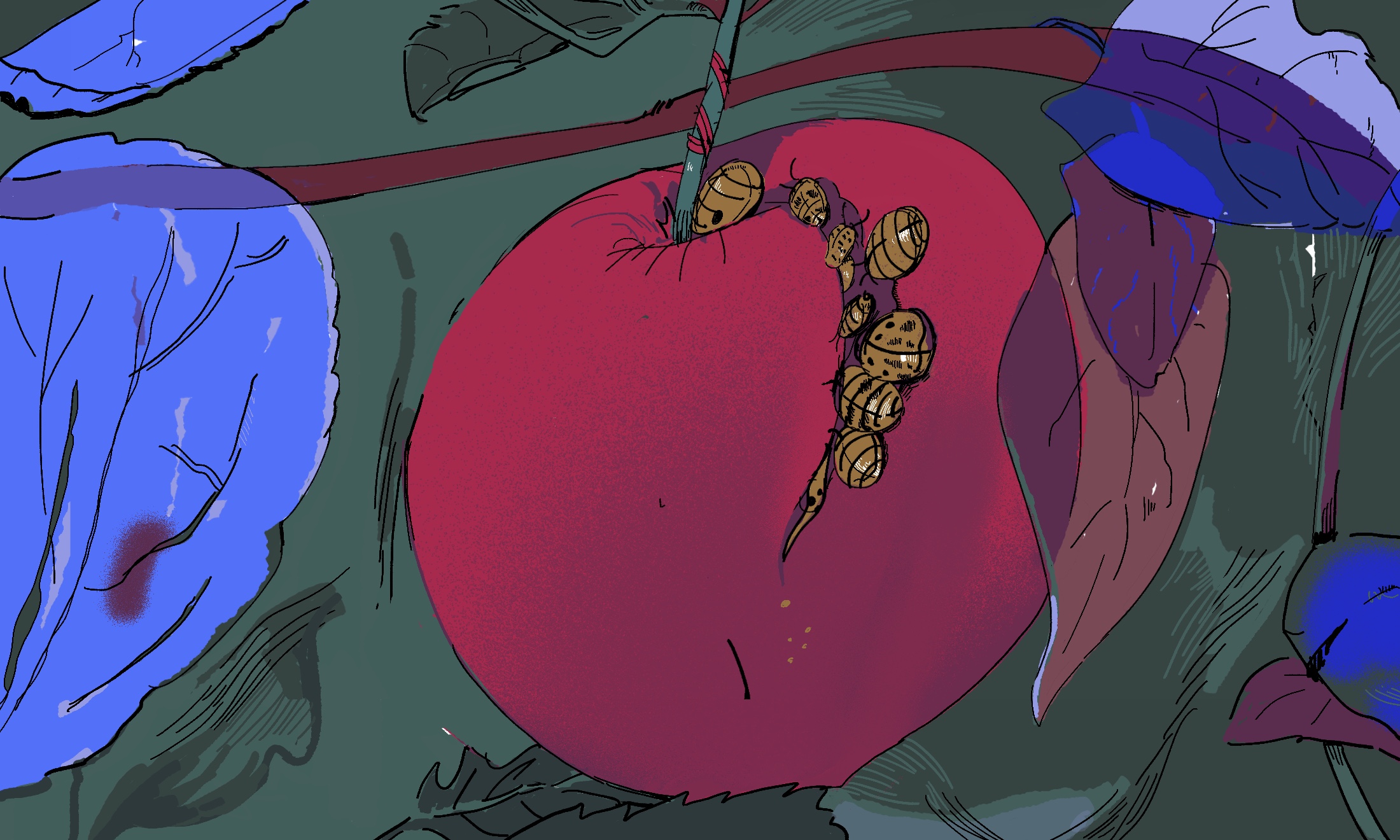
I thought sex parties would free my sexuality. The reality was more dystopian than utopian
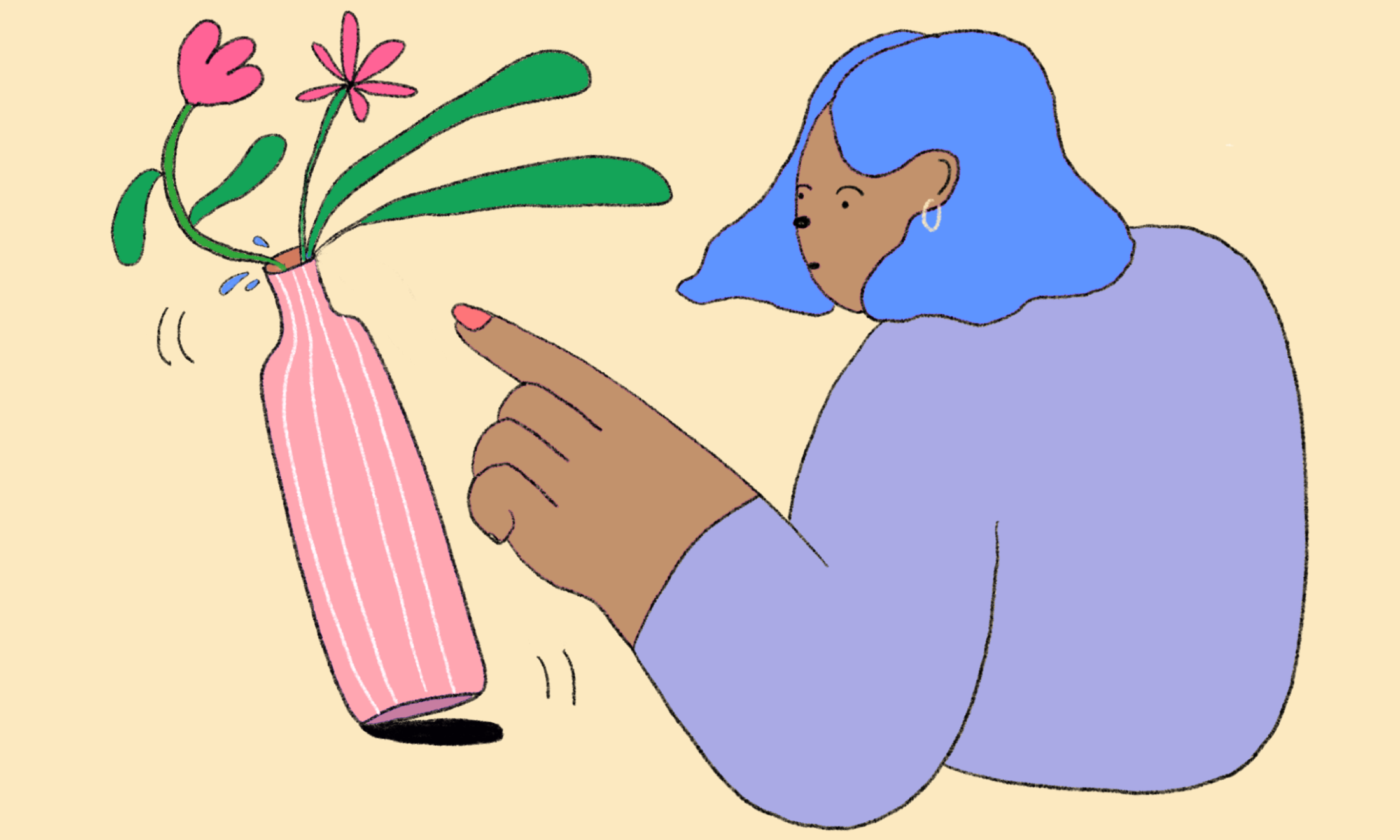
Swipe Left: My ADHD diagnosis changed my idea of sex and romance

Reimagining trauma: how life modelling helped me love my body again
